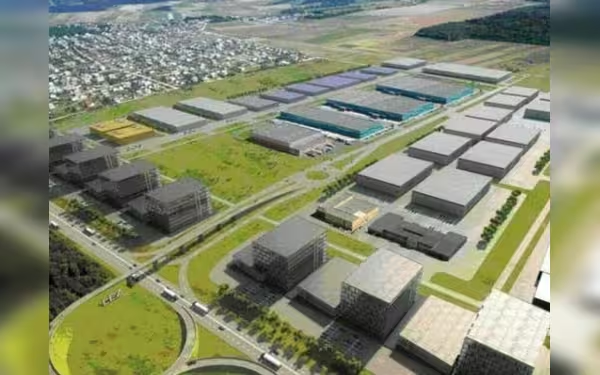Saturday, November 16, 2024 05:38 PM
Sindh Government Announces New Industrial Zone in Karachi
- New industrial zone planned along Northern Bypass in Karachi.
- Sindh government allocates Rs846 million for development.
- SEZMC aims to attract domestic and foreign investors.
 Image Credits: nation_pk
Image Credits: nation_pkSindh government plans a new industrial zone in Karachi, allocating Rs846 million to boost economic development and attract investment.
The Sindh government is taking significant steps to boost the industrial landscape of Karachi, which is known as the commercial hub of Pakistan. With a growing population and increasing economic activities, the need for more industrial zones has become crucial. The provincial government has announced plans to develop a new industrial zone on the outskirts of Karachi, specifically along the Northern Bypass. This area has ample land available, making it an ideal location for new industrial developments.
Currently, over 4,000 industrial units are operational in various districts, including Karachi, Larkana, Hyderabad, Nooriabad, Korti, Nawabshah, and Sukkur. The Director of the Industries Department, Bashir Solangi, revealed that the Sindh government has allocated a substantial budget of Rs846 million for the development of this new industrial zone in the current financial year. This investment is part of a broader strategy to enhance the existing industrial zones in the city, as the government recognizes the importance of industrialization for economic growth.
Karachi, being a port city, offers unique advantages to industrialists, making it a prime location for manufacturing and trade. Solangi emphasized that industrialization is vital for the economic development of the province, and the government is committed to achieving this goal. Furthermore, Saleh Mohammad, the Director of the Established Sindh Economic Zones Management Company (SEZMC), highlighted the company's efforts to facilitate and promote industrial growth in Sindh. SEZMC is working diligently to attract both domestic and foreign investors by providing special exemptions and incentives, which help reduce the costs of doing business.
In addition to attracting investment, SEZMC is focused on establishing special economic zones tailored to various industries, such as IT, media, and marble production. This approach aims to create a structured and planned industrial environment that can support diverse business clusters. Mohammad also mentioned the importance of identifying support services needed by each economic zone, which will help enhance productivity and efficiency.
Sindh is not only the second-largest province in Pakistan but also plays a significant role in the country's agricultural production, contributing 23% to the national output. This agricultural strength, combined with the potential for value addition and foreign trade, positions Sindh as a promising area for investment. With over 30% of the country's large-scale manufacturing units located in Sindh, the province is poised for further industrial growth.
The Sindh government's initiative to establish a new industrial zone in Karachi is a strategic move aimed at fostering economic development and attracting investment. As the province continues to enhance its industrial base, it is essential for stakeholders to collaborate and support these efforts. The future of Sindh's economy looks bright, and with the right policies and investments, it can become a leading industrial hub in the region.













